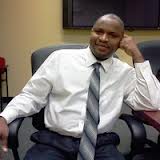
Grammar column writing did not start with him; in fact, this specialization is almost as old as newspaper column writing itself. But not a few people will agree that Professor Farooq Kperogi, Kwara-born, US-based Assistant Professor of Journalism and Citizen Media at Kennesaw State University, redefined that branch of columnism in Nigeria.
I grew up reading ‘Mind Your Grammar’ columns in Nigerian newspapers, but while other writers focus on correcting grammatical errors in newspapers’ publications, Dr. Kperogi goes beyond that traditional approach. This is why you see him write articles like ‘When Food and Grammar Mix’, ‘Top 50 Words Nigerians Commonly Mispronounce’, ‘ Why is Sentiments Such a Bad Word in Nigeria?’, ’10 Most Annoying Nigerian Media English Expressions’, ‘In Defence of Flashing and other Nigerianisms’, ‘Top Election-Related Grammatical Errors in Nigerian English’ etc. That Dr. Kperogi has introduced uncommon creativity to grammar column writing is not in doubt.
What’s more, Dr. Kperogi’s social media savviness has also meant his articles travel beyond the conventional newspapers pages and websites to Facebook, Twitter, online discussion forums and blogging platforms. He is perhaps the first name that comes to mind when grammar column writing is mentioned among millions of cyberians (Nigerians – at home and in diaspora – on the cyberspace), a term Dr. Kperogi coined.
But how did he carve such an enviable niche for himself within a short period of time? JarusHub’s editor got him answer this and other questions:
JH: Can you give me an insight into your growing up?
I was born in the early 1970s in a sleepy, rocky, mid-sized town called Okuta on the westernmost fringes of Kwara State in Baruten Local Government. The town is located on the border between Nigeria and the Republic of Benin. My hometown is called Okuta (a Yoruba word for rock) not because we are Yoruba people, but because British colonialists found Okuta easier to pronounce than Senru Kperu, the original name by which the natives called it. The native language spoken in Okuta is Baatonu, which our Yoruba neighbors like to call “Bariba.” More than 80 percent of the over one million speakers of the Baatonu language live in the Republic of Benin.
I spent the first 18 years of my life in my hometown, which is only a stone’s throw to Benin Republic. Although I am the son of an Arabic/Islamic Studies teacher, I attended government-run, Christian missionary primary and secondary schools, and I owe much of what I am today to the quality education I received in these schools. Read my reflections on my teachers in these schools in my Weekly Trust column of May 10, 2013 titled “Tribute to Teachers Who Made Me Who I am.”
Growing up was rather regimented. On weekdays I went to school from 7:15 a.m. to 2 p.m., came home to eat and take a one-hour nap, went back to school from 3:30 p.m. to 7 p.m. for “afternoon prep” and games, and ended the day by going to Islamic school from 7:30 p.m. to 10 p.m. Wednesdays and Thursdays were the only days we were exempted from going to Islamic school. On weekends, my brothers and I helped my dad in his small, subsistence farm.
I “graduated” from the first level of Islamic school (which involved learning Arabic orthography, calligraphy, recitation of the 60 chapters of the Qur’an, basic Islamic jurisprudence, etc.) when I was in form 2 (what is now called JSS 2) but continued going to the school as a teacher until my final year in secondary school when my dad gave me the whole year to prepare for my school certificate exams.
My secondary school years were some of the most memorable years of my life. It was during these years that I honed my skills in debating and writing. I was president of my school’s debating society and won every single debate I led. I was also president of my school’s press club and the student editor of its yearly magazine.
It was also during the first two years of my secondary school education that I memorized several dictionaries. In my first year, I memorized a junior dictionary and in my second year I memorized the entire Advanced Learner’s Dictionary. I studied and memorized bigger and more challenging dictionaries as my levels increased. I would often challenge my classmates to open any page of the dictionary and ask me to define any word they encountered. I acquired my memorization skills from my unsuccessful attempt to become a Hafiz, that is, a Muslim who has memorized the entire Qur’an.
JH: You once worked in the presidency during the Obasanjo era. Will you consider a similar offer today?
They say never say “never.” But I doubt that I will ever go back to Aso Rock to do the kind of job I once did there. I was merely one of the “little guys” that formed the nucleus of a new unit in the Presidential Villa called the Presidential Research and Communications Unit, which was later renamed the State House Public Communications Unit. We managed the president’s international public communications, wrote his speeches, produced e-newsletters that chronicled Nigeria’s progress, etc.
I learned a lot from the job, which the late Dr. Stanley Macebuh, my boss at the time, used to call “Nigeria’s first paperless office” because of our Unit’s emphasis on high-tech communications. But I am satisfied with what I do now and have no desire to do anything else—at least for now. I derive boundless joy from teaching and research and being in a university environment. I’m perpetually rejuvenated intellectually.
JH: You write a grammar column. What informed this specialization?
I’ve always had a fascination for languages from my formative years. As I said earlier, my dad is an Arabist. He studied Arabic language and culture and speaks and writes more than half a dozen languages. I don’t speak as many languages as my father does, but his enthusiasm for languages did have an early influence on me. Plus, English has been my best subject since I was in primary school, and English grammar has never ceased to fascinate me.
My passion for English grammar crystallized when I enrolled at the Bayero University in Kano for my undergraduate degree in Mass Communication. The program required us to choose a minor in a language for three years. I chose English, which was actually initially my home department before I switched to Mass Communication. Although most of our English courses were in literature, in my third year, I took a course called Media English, which introduced us to the usages and misusages of English in the Nigerian mass media. That course heightened my sensitivity to English usage, especially Nigerian English usage.
And, from the early 2000s when I started traveling to countries where English is spoken as a native language, I began to pay close attention to the patterns of deviations and convergence between Nigerian English and other varieties of English. I recorded my observations in several articles.
I started an exclusive column on grammar when my former classmate and current General Manager of the Abuja-based People’s Daily newspaper, Abdulazeez Abdullahi, requested that I do so to give visibility to his newspaper. I later transferred the column to Sunday Trust for personal reasons. My friend’s request was informed both by his knowledge of my passion for English grammar when we were undergraduates at Bayero University and by the series of articles I wrote in my Weekly Trust column on Nigerian, British, and American English.
JH: As a grammar columnist, have you ever written about something and you found out later that you were wrong?
Yes. But such instances are few and far between. Although I thoroughly research before I write, there are very few occasions when I discovered that what I wrote wasn’t completely accurate. That is what makes me human. I am not infallible. Plus, English grammar is a slippery subject, made even more so by the existence of many established national varieties with sometimes mutually exclusive usage rules, which prompted George Bernard Shaw to once famously quip that “England and America are two countries separated by a common language.”
JH: Some of us think you should have published a grammar book based on your past articles. Do you have this in the cards?
Hundreds of people have written and spoken to me about that over the last few years. I want to assure you that I have already compiled some of my articles and prepared them for publication into a book. The book is currently under review with a publisher. I expect it to be out either late this year or early next year.
JH: You once accused one Phrank Shuaibu of plagiarising your works. Has the last been heard of this matter?
No, the last hasn’t been heard of it. My litigation was stalled by two things. First, I found out that the Phrank Shuaib guy is basically a vagrant with no fixed address. He doesn’t have an address to which my lawyer could deliver a letter to him. My lawyer called him directly to ask for his address and he refused to give it. People who know him closely told us he has no fixed address. We then resolved to write to his “lawyer” who threatened to sue me and Sunday Trust for exposing his plagiarism of my articles.
But, somehow, the letter mysteriously disappeared and can’t be traced up to now. But my lawyer said he can still be sued even if he hasn’t been served a letter. The second snag is that suing him would require my physical presence in Nigeria. So I am waiting to travel to Nigeria before I formally file charges against him. I am going to sue him both for plagiarism (copyright infringement) and libel. He hasn’t only libeled me in his poor attempt at defending himself, he has used and continues to use fake names to write a slew of false, libelous attacks on me on fringe Nigerian websites, which I don’t even bother to read and have resolved never to personally respond to since I’ve already made my case against him.
One of the absolutely laughable charges in the libelous articles is the claim that I also plagiarized other people in my articles. Although the charge is so ridiculous as to be unworthy of my response, I responded to it just for the record in an article titled “Of Phrank Shaibu, Ejiofoh, and What Plagiarism Is and Isn’t.”
JH: Grammar column writing appears restrictive to me, unlike general columns where there are oceans of topics to deal with. Yet, you must write on weekly. Are there times when you go blank on what to write on? Or times you are constrained to write on non-grammar subjects?
Well, I don’t just write a grammar column; I also write a general-interest column every Saturday called “Notes from Atlanta” in the Weekly Trust. So I write two columns every single week, which are simultaneously published on my blog, which can be found at www.farooqkperogi.com. I’ve been writing the general-interest column in Weekly Trust long before I started the grammar column in People’s Daily and later Sunday Trust. I remember that in one of your write-ups on Daily Trust columnists, you mentioned my general-interest column.
But I can understand why my grammar column has kind of eclipsed my other column. I guess it’s because of its uniqueness. It isn’t just opinion writing; it is specialized writing that involved research and that resonates with and addresses many people’s anxieties and insecurities about their use of English.
I have never yet been faced with a situation where I’ve run out of topics to write about. I often generate several weeks’ worth of ideas to write about at a time. And language use presents, infinite, ever-present vistas of possibilities to explore and write about.
JH: On a lighter note, you teach oyinbo English. That is interesting. Have you ever had any experience where some of your students wondered how an African knows so much about a European language?
This question presents me with an opportunity for vain self-congratulation, but I won’t take it. That was a joke. But, seriously, I don’t think many native speakers of English think it’s a big deal that a non-native speaker knows enough about their language to teach it to them. The formal learning of the rules and usage of a language is a deliberate process that no one is born with.
As linguists always say, there is no native writer of any language because writing is a learned activity. There are also very few native speakers of Standard English. That is why both native and non-native speakers are prone to errors in Standard English and why there are thousands of books on English usage even for native English speakers.
It is true, though, that many native speakers, including my former professors, have complimented my English language proficiency. For instance, my master’s thesis supervisor at the University of Louisiana, Professor Tyrone Adams, recently wrote this on my Facebook wall: “You were the only student I have ever encountered during graduate education that made me feel inferior…” That was flattering. Many native speakers have said more flattering things about my knowledge of their language, which modesty would not allow me to reveal here. Of course, I am a perpetual student of the language. I don’t consider myself an expert.
Thank you, Dr.
Other interviews:
Professor Pius Adesanmi, respected columnist and public intellectual
Segun Adeniyi, ex-Media Adviser to late President Umaru Yar’adua
Established in March 2013, JarusHub is a Nigerian information hub with focus on career and management. It is rated Nigeria's most authoritative destination for online career resources. It parades an array of Nigerian professionals who share their career experiences with a view to bridging career information gap and mentoring a generation to success. Whether you're a student, a recent graduate or an established professional, or even an executive, you will always find something to learn on JarusHub. All enquiries to jarushub@gmail.com or 0808 540 4500. Facebook: www.facebook.com/jarushub; Twitter: @jarushub or @mcjarus.
Making the most of your 9-5: An Interview with Jarus
June 27, 2021
16 comments
Let us have your say by leaving a comment belowCancel reply
Recommended For You
-
COMPANY REVIEW: SEPLAT PETROLEUM DEVELOPMENT COMPANY PLC
March 13, 2018 -
HOW TO SWITCH CAREERS
October 20, 2014 -
“EVERYONE THAT LOSES A JOB IS NOW A CONSULTANT”
September 28, 2014








Good job there Jarush. What an all encompassing interview.
This is humbleness, I must ponder deep over this. The interview is interesting and educative. Thanks to the interviewer and the interviewee “Of course, I am a perpetual student of the language. I don’t consider myself an expert.”
It is humility, I think…and of course, I am a student of the language too
“Of course, I am a perpetual student of the language. I don’t consider myself an expert.” Kprogi. This is humbleness, I must ponder deep over this. The interview is interesting and educative. Thanks to the interviewer and the interviewee
Interesting!
[…] Dr. Farooq Kperogi, respected grammar columnist and university don […]
[…] Farooq Kperogi – respected grammar columnist and university don […]
I really enjoyed this…Looking forward to the book as it’s ready for sale.
Good work,mr JARUS.
More power to your elbow.
[…] Farooq Kperogi – respected grammar columnist and university don […]
[…] Farooq Kperogi – respected grammar columnist and university don […]
[…] Farooq Kperogi – respected grammar columnist and university don […]
[…] Farooq Kperogi – respected grammar columnist and university don […]
[…] Farooq Kperogi – respected grammar columnist and university don […]
[…] Professor Farook Kperogi, Respected Grammar Columnist and US-based […]
[…] Farooq Kperogi – respected grammar columnist and university don […]
[…] Farooq Kperogi – respected grammar columnist and university don […]